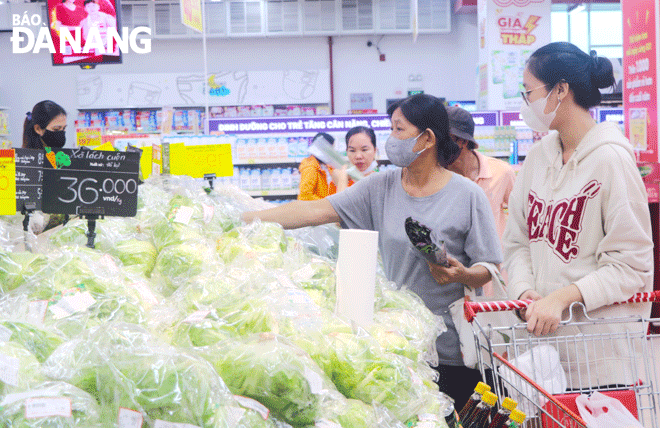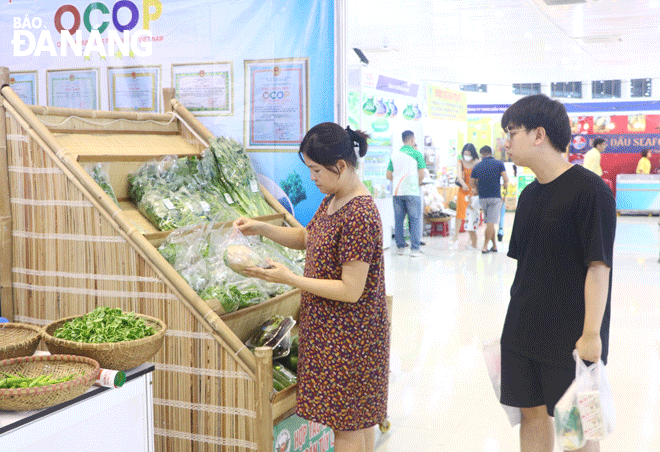Controlling quality of agricultural products sourced from suppliers
Currently, up to 80% of agricultural products that supply the consumption needs of people in Da Nang are imported from localities through suppliers. Programmes to sign cooperation on safe food supply chains are a suitable choice for units and authorities to control input quality. However, according to general assessment, this activity still faces many difficulties and barriers from macro regulations and policies.
 |
| People shopping for agricultural products at Go! Big C supermarket. Photo: VAN HOANG |
Guaranteed traceability of origin
According to the Da Nang Food Safety Management Board, on average, 90% of the city's annual vegetables and fruits sourced from other parts of the country is consumed through the Hoa Cuong Wholesale Market. The city imported about 56,000 tonnes of vegetables mainly from the provinces of Lam Dong, Gia Lai, Quang Nam, Binh Dinh, and Bac Ninh. The provinces of Tien Giang, Vinh Long, Can Tho, Binh Thuan, Soc Trang and Ninh Thuan supply about 76,000 tonnes of fruit.
To ensure the quality of input food, recently, the Food Safety Management Board has coordinated with the Market Management Board to organise the signing of food safety commitments for about 500 family-run businesses at the market, issue a certificate of establishments meeting conditions to ensure food safety and organise sampling to monitor pesticide residues.
For samples whose monitoring results exceed the allowable limit, the agency will send a notice to business establishments and the Market Management Board to stop importing unsafe goods for about 30 days, and at the same time notify them to management agencies in provinces and cities for coordination in food traceability, inspection, and supervision of the recall of unsafe products.
According to Mr. Nguyen Tan Hai, the Head of the Da Nang Food Safety Management Board, traceability and food sampling for vegetables, fruits and other agricultural products are carried out on the basis of applying the Decision. No. 35/2016/QD-UBND 2016 on declaration, traceability and origin of vegetables, fruits and aquatic products imported from other provinces into the market.
In the 2018 - 2022 period alone, the Da Nang Food Safety Management Board took 973 samples of vegetables and fruits imported from cities and provinces, thereby recording 960 samples passing (98.66%) and 13 samples failing.
“Unsatisfactory samples often have such active ingredients as Cypermethrin, Permethrin, Imidachloprid, Carbendazim, Difenoconazole and Acetamiprid exceeding the allowed limit. Pesticide residues are often found in fruits and vegetables such as celery, tomatoes, carrots, oranges, longans, apples, rambutans and grapes. According to regulations, when products do not meet the requirements, we will trace back to localities and suppliers, and temporarily suspend supply cooperation activities.”, Mr. Hai said.
To create a legal basis for food safety management at Wholesale Markets, the Food Safety Management Board is responsible for inspecting and checking periodically and irregularly the implementation of regulations on food safety conditions, ensuring quality and food safety at the market and sampling to monitor contamination in food.
 |
| People shop for vegetable, tuber, and fruit products developed by the Tuy Loan Safe Vegetable Production and Consumption Service Cooperative at the Da Nang Vietnamese Goods Fair 2023 - Honouring OCOP products. Photo: VAN HOANG |
Tighten quality control of agricultural products
However, in reality, the current quality control of agricultural input products is still limited and needs to be tightened further. Currently, testing laboratories are only designated to test about 102 active ingredients of pesticides. Testing time usually lasts about 5-7 days whereas vegetables and fruits are foods that spoil quickly, so sampling vegetables, tubers, and fruits to monitor pesticide residues is still difficult and the efficiency is not high.
In an effort to improve efficiency in managing and monitoring the quality of input agricultural products, the Da Nang Food Safety Management Board has proposed to accelerate the investment progress of the Hoa Phuoc Wholesale Market construction project to meet the national technical standards according to Circular No. 01/2018/TT-BNNPTNT dated October 11, 2018 of the Ministry of Agriculture and Rural Development.
Also, heed will be paid to strengthenning professional training to improve the capacity of professional staff, especially expertise in management, supervision and inspection of food safety in the field of pesticide residues.
It is necessary to promote publicity work so that wholesale market traders can well carry out their responsibilities in declaring the origin of goods, taking samples to monitor pesticide residues, contributing to improving the quality of goods, serving consumer needs and ensuring people's health.
Reporting by PHAN CHUNG - Translating by A.THU